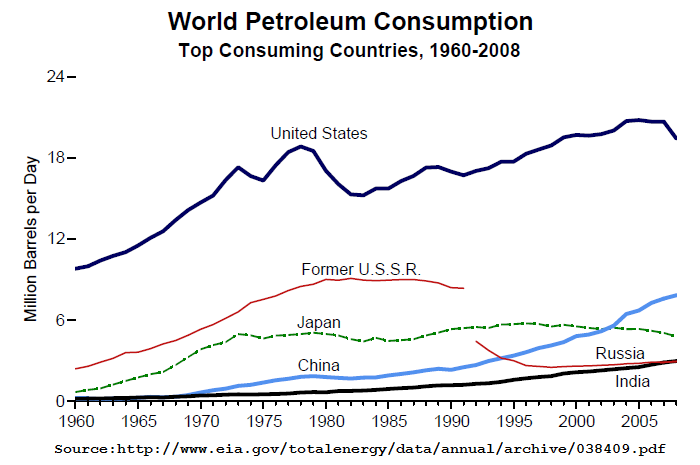The Prize, Chapter 27 Overview
The trend in the rapid increase in the consumption of oil continued in a straight line after WWII. For example, both world and US energy consumption tripled between 1948/49 and 1972. The post-WWII oil use explosion was due to a number of factors including economic and income growth, increased standard of living, huge increases in automobiles, increased use of plastics, decreasing oil prices, and exporting countries demanding more and more production to increase their revenue. Thus, production, reserves, and consumption all pointed in one direction-UP, and the saying “bigger is better” engulfed the consumer and oil industry.

The line graph shows the world petroleum consumption of the top consuming countries from 1960 to 2008. The United States consumed the most, with a peak around 1978 and a general upward trend. The Former U.S.S.R. had a relatively flat consumption rate. Japan's consumption remained relatively stable. China's consumption increased gradually, while Russia's consumption decreased and India's consumption increased in the later years.
You will see in this chapter how oil is the foundation upon which so many things changed in society. At the surface, you may not think they are related- fast food restaurants, suburbs, motels, drive in movies, the interstate highway system, and more are all are rooted in the growth of the automobile and increased mobility of the average consumer. And this only happened because oil was the catalyst behind the growth of the automobile industry. One can debate the wisdom of this dependency, but the fact is that societies became fully integrated with oil.
This integration of oil was so prevalent that it actually began to unseat “king coal” which had dominated the energy market for over century before. Oil was cleaner (avoiding the “killer fogs”), easier to process, and more efficient than coal so even in cases where coal may have been cheaper overall, oil still won. But coal eventually even lost the cost advantage. The new lifestyle of society would not work with coal as the dominant source of energy and transition was inevitable. This transition was happening not only in the US, but Europe and Japan as well, although for slightly different reasons. Competition shifted from oil vs coal to oil vs oil, as more companies came into the game. And this led to jockeying for position of who has the “best oil.” Enter the additives and special gasolines. When you go to a gas station, note how many variations there are; and think about the early days when it was simply “gasoline”.
Who would have thought that one of the most popular television programs of the time was about the oil industry? In 1962, the number one TV show was the Beverly Hillbillies, with a theme song:
“Come and listen to a story ‘bout a man named Jed, A poor mountaineer, barely kept his family fed, Then one day he was shooting at some food, When up from the ground come a ‘bub-a-lin’ crude, − oil that is, black gold, Texas tea.” (Flatt & Scruggs, 1962, 0:17-00:39, The Ballad of Jed Clampett)
And it did not end there, as we will see later in the 1980s a number of oil industry -based television shows. One of the most famous of the 70s was “Dallas” with the fictional Ewing Oil company.
But there were dark clouds on the horizon when conflict broke out in several places, almost at the same time. The Arab-Israeli conflict and conflict in Nigeria threatened to cause major disruption of the global oil market. However, with a little bit more work than during previous energy crises, the Organization for Economic Cooperation and Development (OECD) approved a relief plan that involved the deployment of supertankers. Under American and international coordination, petroleum from non-Arab countries was sent to embargoed countries, and Arab oil was sent to non-embargoed countries.
The system of redistributing supplies by the international oil companies themselves where they were needed worked so well that the emergency joint operations were not even utilized. There was simply plenty of excess production capacity to overcome the oil weapon. Thus, it was clear by then that the embargo had failed, with the major losers being the Arab oil-producing countries, and by September, the embargo on the US, Britain, and Germany had been lifted.
The two lessons the US drew out of the embargo were the importance of diversifying sources of supply and of maintaining a flexible tanker fleet. The worldwide surge after the six-day war, as expected, caused supplies to exceed, at least in the short term, demand, with no worry of availability. Unfortunately, now that the war had demonstrated the importance of security of supply, the hydrocarbon man took oil for granted again and embarked on his old lifestyle, knowing that oil was abundantly available and cheap. This will prove to be a costly mistake.
The Prize, Chapter 27 - Hydrocarbon Man
Sections to Read
- Introduction
- Old King Coal Deposed
- The Conversion of Europe
- The Struggle for Europe
- Courting the Consumer
- The New Way of Life: "Six Sidewalks to the Moon"
- Crisis Again: "A Recurring Bad Dream"
Questions to Guide Your Reading:
- What impacts did surplus have?
- What was happening with coal at the time?
- Where in the world was trouble now brewing?
- What gave a false sense of security?
